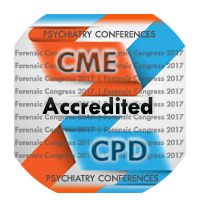
Matthew Rinaldi
King’s College London, UK
Title: Hospital admission for severe paediatric dissociative disorder
Biography
Biography: Matthew Rinaldi
Abstract
Statement of the Problem: Dissociative disorders are an under-researched condition in child and adolescent mental health and no specific guidelines exist to inform management.
Methodology & Theoretical Orientation: We audited the outcomes of patients diagnosed with dissociative disorders as part of their difficulties over a 5-year period on a tier-4 national and specialist inpatient unit for children between the ages of 4 and 13. Information was collected for diagnoses, gender, length of admission, medication on admission and on discharge, Children’s Global Assessment Scale (CGAS), Health of the Nation Outcomes Scale for Children and Adolescents (HONOSCA), additional investigations, interventions, Mental Health Act (MHA) status and Discharge plans.
Findings: Six female patients were identified and their diagnoses included dissociative motor disorder, dissociative seizures and other dissociative disorders (fainting) and all patients had several co-morbidities. Mean CGAS and HoNOSCA scores improved from admission to discharge for all patients from 36 to 64 and 15 to 5 respectively. The mean length of admission was 172 days (Range: 114 - 232). No patients were detained under the MHA. Treatment programmes were varied between the patients according to need. The most common interventions were Cognitive Behavioral Therapy, additional physical health investigations for those with co-morbid physical health diagnoses, family therapy, occupational therapy and medical review. Novel treatment methods such as mindfulness, play therapy and mirror box therapy were also employed.
Conclusion & Significance: We recommend that patients with dissociative disorders are offered these interventions, tailored to their needs. Future research is required to create guidelines for evidence-based practise and to develop novel treatment methods for this complicated patient group.

